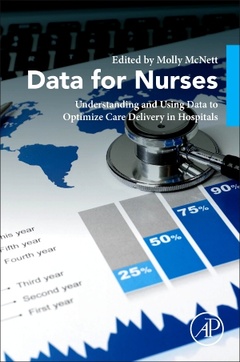Description
Data for Nurses
Understanding and Using Data to Optimize Care Delivery in Hospitals and Health Systems
Coordinator: McNett Molly
Language: English
Subjects for Data for Nurses:
Keywords
Benchmarks; Confidentiality; Data security; Dissemination; Evidence-based models; Evidence-based practice; Financial metrics; Health system reimbursement; Healthcare change; Healthcare quality; Hours per patient day; Implementation science; International; Nurse staffing; Nursing education; Nursing quality indicators; Nursing-sensitive indicators; Presentations; Privacy; Publications; Quality improvement; Quality reporting; Research; Translational science
132 p. · 15x22.8 cm · Paperback
Description
/li>Contents
/li>Readership
/li>Biography
/li>Comment
/li>
Data for Nurses: Understanding and Using Data to Optimize Care Delivery in Hospitals and Health Systems provides information for nurses on how to work with data to effectively evaluate and improve care delivery for patients. Quality, benchmarking, and research data are increasingly used to guide care in hospitals and health systems, and nurses are expected to actively use this information to identify interventions to optimize outcomes and meet reporting and financial targets. However, not all nurses receive formal training on data utilization, making interpretation and application of the different types of data difficult.
This book provides information on topics such as benchmarking and reportable indicators, financial metrics, quality improvement, research, and implementation science, with applications to nursing practice. Important information on protective measures to guarantee integrity and security of personal patient data is also included.
The book is a valuable resource for nurses and other healthcare professionals who require a basic understanding of key principles of data utilization in order to increase engagement in evidence-based practices, quality improvement, and mandatory reporting of key indices.
1. Why Data Matters2: Quality and Benchmarking Data in Health Systems
3: Research Data in Health Systems
4: Financial Data in Health Systems
5: Evaluating Data to Guide Care Delivery: Quality Improvement Methods and Implementation Science
6: Protecting the Data: Security and Privacy
7: Determining the Dissemination Plan: Internal and External Considerations
8: International Perspectives on Data
nurses; graduate students of nursing and medical informatics; health care workers
- Explains the differences between research data and quality improvement data
- Provides examples of project design, data usage, data storage and data dissemination
- Presents tables and figures that highlight mandatory reporting and how to correctly interpret and track information when making decisions about care delivery

